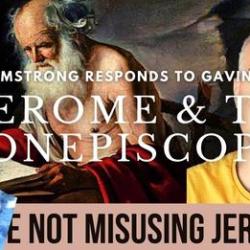Lectionary Reflections
Matthew 5:21-37
February 16, 2014
When a parent asks their child: "Are you contradicting me?" there is really no right answer. If the child says "no," they are contradicting them. If the child says "yes," they are contradicting them. Is Jesus contradicting the law? Jesus' antitheses' answer to that question is "Yes and No." In Matthew 5:21-48, Jesus offers a series of six "antitheses" or contrasts.
In these teachings, which Jesus prefaces with the words "You have heard it said, but I say to you..." (5:21-48), Jesus is presented as the God-authorized interpreter of the law. The verses that precede the antitheses clarify the relationship between Jesus and the law and between his followers and the law.
Do not think that I have come to abolish the law or the prophets; I have come not to abolish but to fulfill. For truly I tell you, until heaven and earth pass away, not one letter, not one stroke of a letter will pass from the law until all is accomplished. Therefore, whoever breaks one of the least of these commandments, and teaches others to do the same, will be called least in the kingdom of heaven; but whoever does them and teaches them will be called great in the kingdom of heaven. For I tell you, unless your righteousness exceeds that of the scribes and Pharisees, you will never enter the kingdom of heaven.
A helpful paraphrase of verse 17 would be: "Do not suppose that my mission is to abrogate (repeal or do away with) the law or the prophets' interpretation of the law; my mission is not to abrogate but rather to confirm the law and the prophets by interpreting Scripture in terms of God's ultimate will." (Hare, 23) Verse 18 indicates that Jesus shared the view of Scripture of first-century Jews: that it was inspired by God and could not be set aside. Verse 19 is probably aimed at radical Christians who rejected the authority of Scripture. Disagreements about how to interpret certain passages abounded then as now. Sadducees, Pharisees, Essenes, and others disagreed vociferously about how various passages should be interpreted and applied.
This high view of scripture did not prevent innovations in interpretation that departed radically from the strict letter of the law. By Jesus' day, many prescriptions of the Mosaic code had become dead letters, including most of the death penalty rules. Thus Matthew's Jesus can affirm the authority of Scripture and that it will be fulfilled in God's good kingdom (when "heaven and earth pass away"). He can also affirm that his interpretation is authoritative, in keeping with the ultimate will of God. When the scribes taught, they cited other rabbinical interpretations to give their own credibility. So when Jesus finished his Sermon on the Mount, "the crowds were astounded at his teaching, for he taught them as one having authority and not as their scribes" (7:28-29).
Faithfulness to his interpretation leads to a righteousness that exceeds that of the scribes and Pharisees, not in quantity, but in quality. The Pharisees were concerned to preserve the distinctiveness of Judaism and had numerous interpretations of Torah concerning ritual cleanliness, dietary habits, and Sabbath activities. These were designed to be constant reminders of God's faithfulness in the midst of the details of everyday life. In practice, they could become substitutes for inward obedience.
Jesus' followers' obedience must be to the spirit of Torah as revealed to them by Jesus, not merely to the letter as strictly construed by their opponents (7:15-20). That obedience will manifest itself in ethical behavior, even when that behavior is at odds with ritual convention (7:12). This is the higher righteousness that is thematic to this gospel. The theme of obedience to the spirit of Torah is the common denominator of Jesus' teachings on adultery, divorce, oaths, retaliation, almsgiving, prayer, and fasting that follow this passage. It is explicitly expressed in Jesus' teachings about trees and their fruits (7:15-20). The theme continues in Jesus' warning that it takes more than calling on his name to enter into the kingdom of heaven, it takes being a doer not just a hearer (7:21-28).
Jesus was out to reform the religion of his day, not reject it. In these antitheses, he illustrates what fulfillment of the law (5:17) and greater righteousness (5:20) mean with regard to murder, adultery, divorce practices, oath taking, retaliation, and love of enemies. In every case he offers an intensification and internalization of current practices, pointing to the adherence of his interpretation to the intention of Torah. A repeated theme of Jesus, both in Matthew 5 and throughout the gospel, is that the law needs to be kept in the heart. "Where your treasure is, there will your heart be also" (6:21). "For out of the heart come evil intentions, murder, adultery, fornication, theft, false witness, slander. These are what defile a person, but to eat with unwashed hands does not defile" (15:19-20). Intense and internal—this is both what Jesus affirms about the heart of the Law and what he critiques as lacking in its current interpretation.
Is Jesus contradicting the law? Yes, if we are talking about current interpretations of ethical behavior with regard to arenas of human relationships as specified in the antitheses. No, if we're referring to the spirit and intention of Torah.
Sources Consulted
Douglas Hare, Matthew: Interpretation Bible Commentary Series
Alyce M. McKenzie, Matthew: Interpretation Bible Study Series (Westminster John Knox Press, 1998)
Donald Senior, Matthew: Abingdon New Testament Commentaries
12/2/2022 9:10:31 PM





